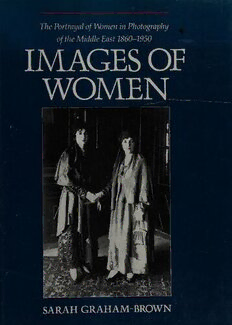
Images of Women: the Portrayal of Women in Photography of the Middle East, 1860-1950 PDF
Preview Images of Women: the Portrayal of Women in Photography of the Middle East, 1860-1950
The Portrayal of Women in Photography of the Middle East 1860-1950 — IMAGES OF WOMEN SARAH GRAHAM-BROWN T he portrayal of Middle Eastern women in the West, particularly in the media, still relies heavily on a number of well-worn cliches about the 'exotic East': images drawing on Orientalist visions of harems, veiling and seclusion, of women as 'gilded prisoners' which reached the height of popularity in the nineteenth century. Images of Women examines how these Western stereotypes of women in the Middle East were shaped and perpetuated by photographs taken in the nineteenth and early twentieth centuries by commercial studios, travellers, missionaries and anthropologists. Photographs of women taken by Westerners are also contrasted with those taken or commissioned by well-to-do Middle Eastern families or individuals. At the same time Sarah Graham-Brown analyses, in a series of interconnected essays, the uses photographs may have in documenting the largely hidden history of women in the Middle East. The book focuses on the areas in which both Western and indigenous photography was most widespread: Egypt, Syria, Lebanon, Palestine, Algeria, Turkey and Iran, with more limited reference to Iraq, Morocco, Yemen and Arabia. Photographs represent only one type of evidence, sometimes problematic, of change and continuity in women's lives at this time. They are set in a wider political and social context by drawing on written sources and oral histories to suggest the variety of ways in which Middle Eastern societies responded to socio-economic change, and how Western political and cultural ideas were resisted or internalized. This was a process in which the status and image of women and womanhood often played an important symbolic role. The book stresses the diversity of responses from women themselves and suggests that the popular images of Middle Eastern women, either as passive victims of a 'benighted' system or as symbols of 'modernity' and 'progress' are oversimplified. Images of Women is a remarkably thorough social history demonstrating how the introduction of the camera to the Middle East helped at once to illuminate and obscure the predicament of women. IMAGES OF WOMEN ' >‘i ^et If ** t ■ » ^ 7 /’ / ? s - I - iAj< A- The Portrayal of Women in Photography of the Middle East 1860-1950 IMAGES OF WOMEN SARAH GRAHAM-BROWN WITHDRAWN BATES COLLM library New York Columbia University Press 1988 Copyright © Sarah Graham-Brown 1988 All rights reserved Printed in Great Britain Library of Congress Cataloging-in-Publication Data available on request ISBN 0-231-06826-3 Contents Acknowledgements Chronology Introduction Photography and Social History. Visions of the Orient and Its Women in Nineteenth-century Europe. The Development of Anthropology and Popular Ethnography. Women on Women. The Impact of Political and Economic Change. National Revival and the Role of Women. I The Development of Photography in the Middle East Through Western Eyes: European Photographers. The Development of the Commercial Photography Market. Studio Fantasies. Photography, Anthropology and Ethnography. The Development of Indigenous Photography. Power and Patriarchy: Women as Subjects of Photography. Power and Persuasion: Photographers and Their Female Subjects. II The Seen, the Unseen and the Imagined: Private and Public Lives Seclusion and Segregation. Hidden Away from the World? The Camera and Women’s Horizons. III Family Portraits Images of Marriage and Family Life. The Kamil Family. Western Views of Middle Eastern Families. Mothers and Children. Family Memories. A Lebanese Woman’s Journey. An Armenian Family. IV Dressing the Part Costume in an Era of Social and Economic Change. Western Images of Veiling and Exposure. States of Undress. The Politics of Dress: Nationalism and Feminism. Removing the Veil. Dressing Up. V Working Women 144 Women and Agriculture. Divisions of Labour. Work in the Village. A Weaving-song. Women and Work in Urban Environments. Women and Property. Crafts. Changing Roles for Women in the Workforce. Women and the Professions. VI Women in the Public Eye 170 Women as Entertainers. Entertainers in the Community. The Export of ‘Oriental Dance’. Women and the Development of the Theatre and Mass Media. The Changing Image of Umm Kulthoum. VII The Spread of Education 192 Attitudes to Women’s Education. The Missionary Influence on Women’s Education. Memories of a Catholic Education, Lebanon. The Development of State Education. Higher Education and the Educational Establishment. The Education of a Woman Doctor. VIII Campaigning Women 210 New Images. Challenging Authority: a Babi Intellectual. The Development of Feminist Ideas. Feminism and the State: Turkey and Iran. ‘Independent’ Feminism: Egypt. Feminism and Nationalism. Afterword Western Images. 239 Notes 252 Bibliography 260 Photographic Credits 266 Index 269
